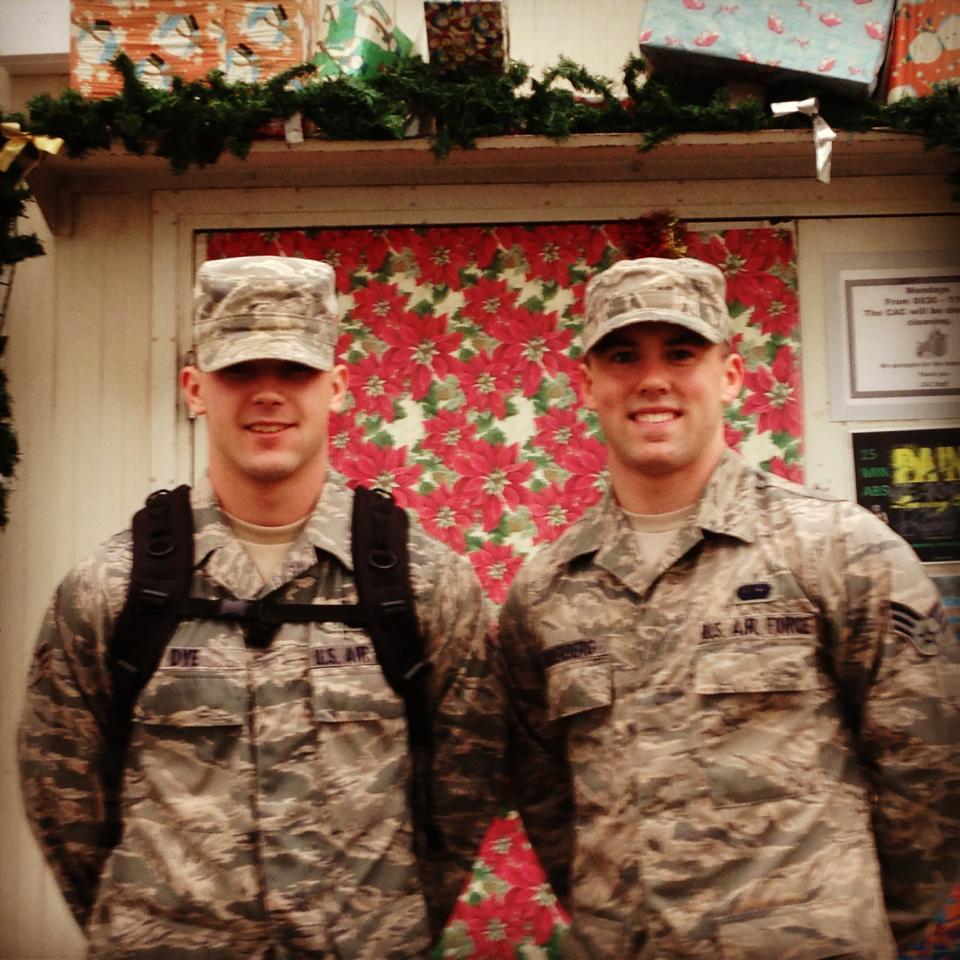Student veterans balance hard-earned skills, blending in

Sam Soderberg, right, and a fellow serviceman celebrate the holidays while on active duty in the United Arab Emirates in 2012.
For members of the military, the best camouflage happens when they’re out of uniform.
Sam Soderberg’s hair is short but not buzzed; on a November morning, he looks like any other economics major getting coffee before class. He has an eye for his fellow service members, picking up cues that give away men and women who have served in the military.
“It’s kind of hard to know that we’re here – not that we need recognition by any means,” says Soderberg, a senior from Mosinee, Wisconsin, who serves in the Wisconsin Air National Guard’s 128th Air Control Squadron, based at Volk Field in Camp Douglas.
Soderberg is one of hundreds of students attending the University of Wisconsin–Madison thanks to educational benefits from the GI Bill. Many other student veterans attend on their own dime, sometimes after exhausting benefits in other programs.
Due to the complexity of the military and the breadth of student veterans’ experiences, their needs are not always understood by those who haven’t served. That’s where John Bechtol and Joe Rasmussen come in. Veterans themselves, they staff the Veteran Services and Military Assistance Center, which opened in 2014.
The center builds rapport with students by helping with everything from navigating government bureaucracy to finding apartments and dealing with unexpected events.
When Soderberg arrived on campus in the fall of 2011, the unstructured life of a college freshman ended up being more of a challenge than he’d anticipated after the rigid structure of active duty.
“Looking back, I wish I would’ve reached out to resources, especially when I found out that I was going to be deployed the next year,” says Soderberg. “Not knowing if I was going to come back to school afterwards affected my mentality with schoolwork.”
Soderberg spent six months on active duty in the United Arab Emirates and has been back in school continuously since returning to campus as a sophomore in 2013.
“After deployment, college becomes easy,” he says. “It’s just showing up on time and doing what you’re asked to do.”
Indeed, returned veterans often have higher GPAs than the general population, bucking the stereotype that some people join the military because they couldn’t handle college study. Increasingly, they pursue high-level graduate work in a variety of fields.
“We have a ton of graduate students,” says Bechtol. “We have a lot of MBA students, as well as a bunch of students in social work and law. More med students, too.”
Last fall, an article on the proliferation of veterans in social work noted that nearly 20 percent of graduate students receiving veterans benefits at UW–Madison are pursuing a master’s degree in social work. Rasmussen received his MSW in 2012.
Rasmussen and Bechtol’s experiences complement the familiarity provided by Veterans, Educators, and Traditional Students (VETS), the student veteran organization on campus. Another key component of campus support, the group provides a sense of camaraderie that can’t be matched by “taking Accounting 100 together,” as Soderberg puts it.
“When I returned from overseas, the services that I got involved more informal advice: transferring the mindset of the military to the academic setting and getting the most out of your abilities,” he says.
Still, it’s important to recognize that every veteran is different.
“Sometimes your personal side can get a little washed away,” says Soderberg. “I think a lot of people assume that military guys are kind of vanilla; they all kind of have the same story.”
Soderberg has lots of stories. Ask about his long-dormant tuba skills, and he’ll tell you how they led him to air-conditioned rehearsals instead of drill training under a scorching Texas sun. Or he’ll talk about unwittingly dancing his way into a new appreciation for West African and Caribbean culture, thanks to Chris Walker, associate professor of dance.
At the end of the day, Soderberg hopes that people who have little connection to the military will reach out to service members anyway, even if they’re unsure what to say.
“For those who are not in the military,” he says, “the effort is what counts.”
Tags: student life, veterans
